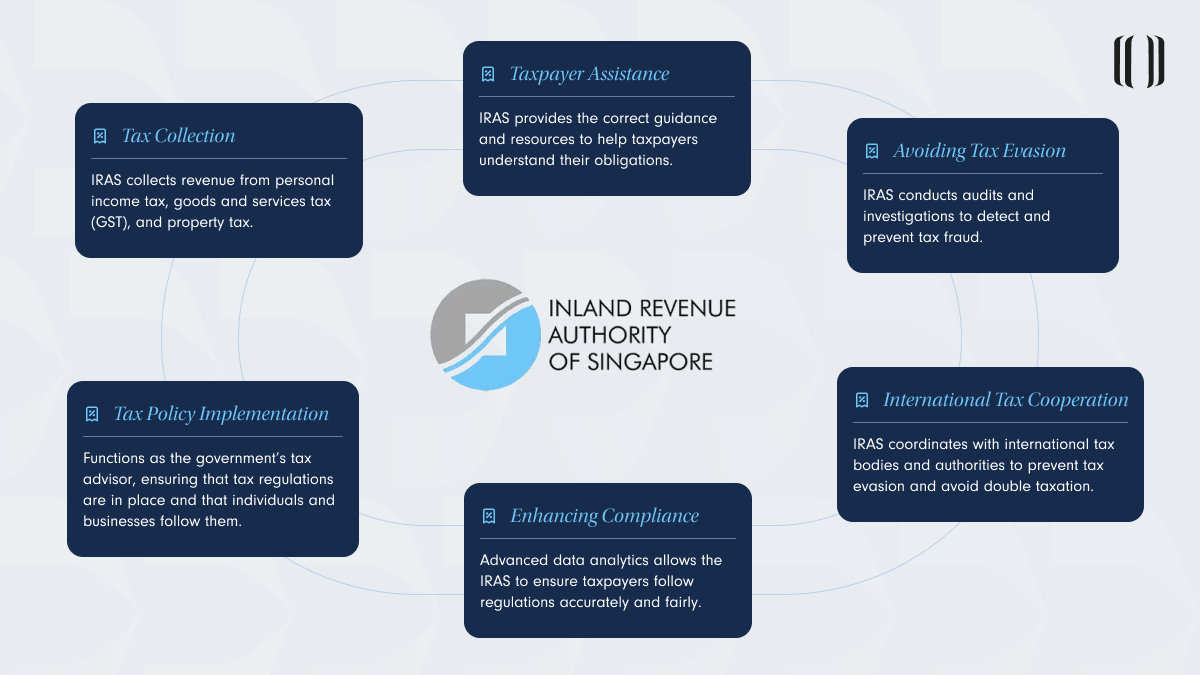Reading time 8 minutes
Inland Revenue Authority of Singapore (IRAS): A Complete Guide
The Inland Revenue Authority of Singapore (IRAS) manages the country’s tax system. It is responsible for administering taxes and enterprise disbursement schemes. As a government agent, it provides services in administering, assessing, collecting, and enforcing payment of taxes. Understanding what IRAS Singapore is helps in staying compliant with tax obligations as an individual taxpayer and a business owner.What is the Inland Revenue Authority of Singapore (IRAS)?
The Inland Revenue Authority of Singapore (IRAS) is the government agency responsible for tax administration in Singapore.Digging into a bit of its History:
The Singapore Income Tax Department was established in 1947 as the nodal authority for administering the Income Tax Ordinance. The actual assessment of tax obligations started in 1948. IRAS Singapore was established as a statutory board within the Ministry of Finance, Government of Singapore. Established in 1992, the IRAS functions under the Ministry of Finance and plays a pivotal role in collecting taxes (IRAS Income Tax) that contribute to Singapore’s economy. IRAS oversees various forms of taxation, including personal income, corporate, and property taxes. As the nation’s sole authority on tax administration, it also guides individuals and businesses on tax regulations and compliance. The Inland Revenue Authority of Singapore ensures that reasonable tax policies are implemented, helping maintain national stability and growth while representing the government in treaty negotiations, drafting tax laws, and advising the government on property valuation.Functions of IRAS

Role of IRAS in Taxation
IRAS Singapore significantly impacts Singapore’s taxation landscape. As the primary tax collection agency, IRAS ensures that tax laws are enforced stringently while encouraging voluntary compliance. It also glorifies Singapore’s reputation as a transparent and fair tax jurisdiction. Some key areas where IRAS plays a role include:- Ensuring Corporate Tax Compliance– Businesses must comply with IRAS corporate tax regulations to avoid penalties.
- Enforcing Tax Incentives – IRAS offers tax incentives to promote investment and business growth.
- Clarifying Tax Policies – IRAS regularly updates tax policies and guides individuals and businesses on tax filing.
- Boosting Economic Growth – IRAS funds infrastructure, healthcare, education, and general economic growth by efficiently collecting revenue and preventing tax defaults.
How to File Taxes with IRAS
Filing taxes with IRAS Singapore is a breezy process if you follow the proper procedures promptly. Individuals and businesses must meet the deadlines and provide accurate financial records. Before logging into the myTax Portal, it’s important that you prepare the required documents, including your Singpass/SFA, Form IR8A (if your employers are not in the Auto-Inclusion scheme), dependents’ details for relief claims, rental income, and business details for self-employed. Ensure that you declare any additional income and update tax reliefs. After submission, you will receive an acknowledgement from IRAS. If you need to make changes, you can re-file once within 7 days or before 18 April, whichever is earlier. Tax Filing for Business: All companies must file Singapore corporate tax returns on estimated chargeable income (ECI) within three months from the end of the financial year.- Register for GST (if applicable) – Businesses earning over SGD 1 million must register for GST unless GST is exempted.
- Prepare Financial Statements – Maintain accurate financial records.
- File Corporate Tax Returns – Submit Form C-S or Form C via the myTax Portal.
- Pay Taxes Promptly – Ensure timely payment to avoid penalties.
- Maintain Records – Maintain tax-related documents for at least five years.
- Understand Tax Incentives – Businesses should explore available tax exemptions and incentives IRAS company tax policies provide.
Types of Taxes Managed by IRAS
 IRAS administers several types of taxes, each serving different purposes:
IRAS administers several types of taxes, each serving different purposes:
1. Personal Income Tax
Singapore residents and non-residents who earn income must file income tax annually. The tax rates vary based on income levels, and tax reliefs or deductions can be claimed to reduce taxable income.2. Corporate Tax
As discussed above, corporations must file taxes on estimated chargeable income within three months from the end of the financial year. IRAS company tax and IRAS corporate tax apply to businesses operating in Singapore. The corporate tax rate is 17% on taxable income. Businesses may also qualify for tax incentives and exemptions to lower their tax liabilities.3. Goods and Services Tax (GST)
A consumption tax of 9% (effective from 2024) applies to goods and services in Singapore. Businesses registered for GST must file GST returns periodically.4. Property Tax
Owners of residential and commercial properties must pay property tax based on annual value. The Inland Revenue Authority of Singapore determines property and land valuations annually.5. Stamp Duty
Stamp duty is a crucial component of the IRAS tax policies, applicable to property transactions, rental agreements, and share transfers.6. Withholding Tax
A tax on payments made to non-resident companies or individuals for services provided in Singapore.Why IRAS Matters for Businesses
IRAS ensures businesses operate within Singapore’s regulatory framework. Here’s why companies should pay close attention:- Tax Law Compliance – Proper tax filing avoids penalties and upholds business image.
- Financial Transparency – Accurate tax reporting boosts credibility with stakeholders.
- Tax Incentives – Businesses can benefit from tax exemptions and rebates.
- GST Compliance – Proper GST registration and filing prevent legal complications in later stages
- Corporate Tax Relief – Startups and SMEs can use IRAS’s tax exemption schemes.
- Risk Mitigation – Companies that follow IRAS corporate tax guidelines minimize risks of audits and penalties and tarnishing brand image.
Common Tax Filing Mistakes
Many taxpayers make errors that lead to penalties or audits. Here are some common mistakes to avoid:- Incorrect Income Declaration – Underreporting income can lead to fines and audits.
- Missed Deadlines – Late filing attracts penalties and interest charges.
- Failure to Register for GST – Businesses earning over SGD 1 million must register for GST.
- Claiming Illegitimate Deductions – Only legitimate business expenses can be deducted.
- Not Keeping Proper Records – Businesses must maintain accurate financial documents for tax compliance.
- Misinterpretation of Tax Laws – Misunderstanding or not following IRAS revenue and tax policies may lead to incorrect filings.
Streamline Your Filing with Lanturn
The Inland Revenue Authority of Singapore (IRAS) maintains a fair and efficient tax system in Singapore. Whether you are an individual taxpayer or a business owner, understanding IRAS’s functions, procedures, and compliance requirements ensures a smooth tax experience. By staying informed and following tax regulations, taxpayers avoid penalties and benefit from tax incentives and reliefs provided by IRAS Singapore. As the leading tax authority, IRAS supports and enhances transparency and efficiency in Singapore’s taxation system, boosting economic growth and stability. Do you still need help paying your taxes in Singapore? Leave your tax filings with Lanturn’s team of experts. We stay on top of your accounting and tax needs and ensure everything is filed on time with 100% accuracy. Schedule a call, and let you help you stay compliant while you focus on your business.
Post Views: 807

